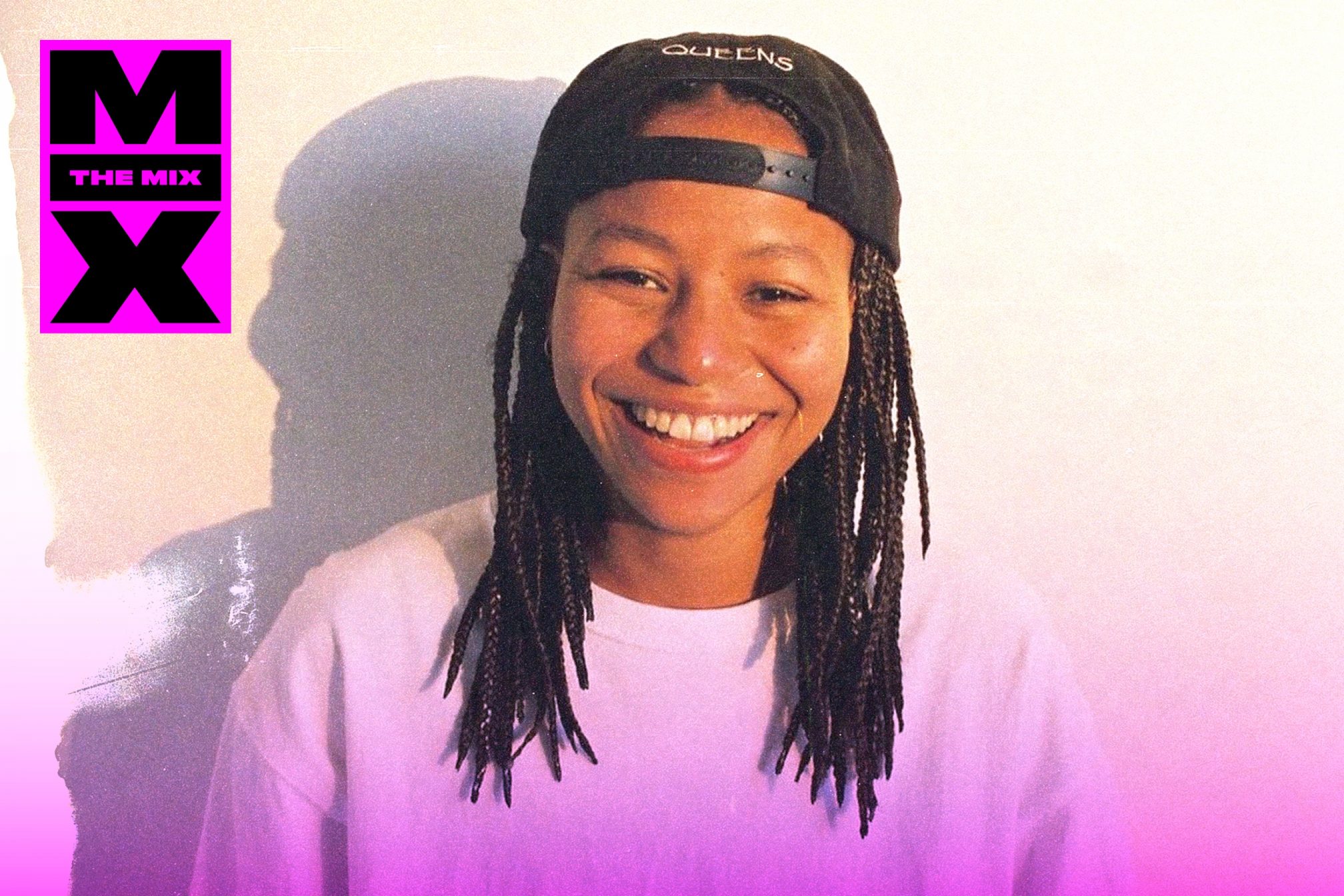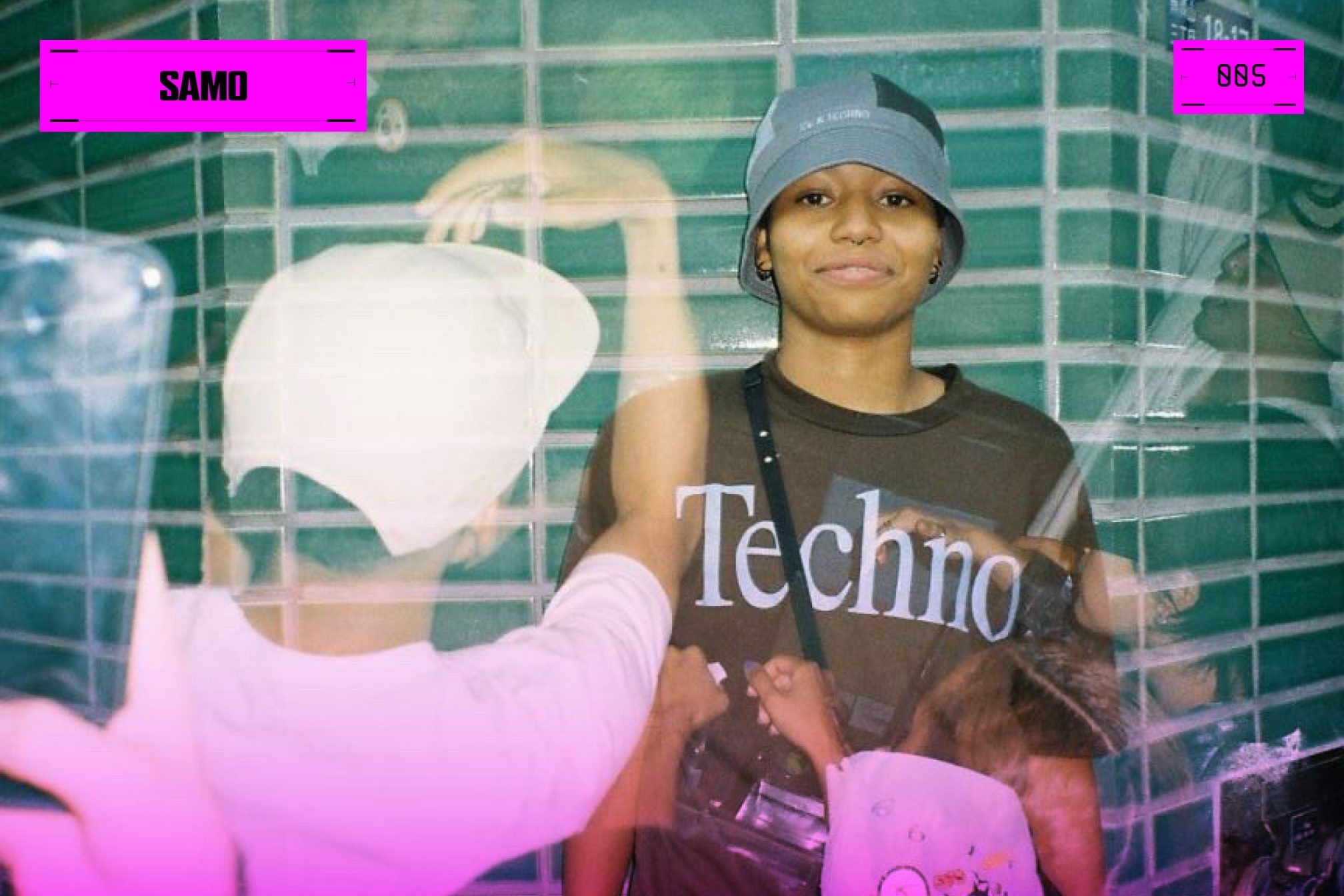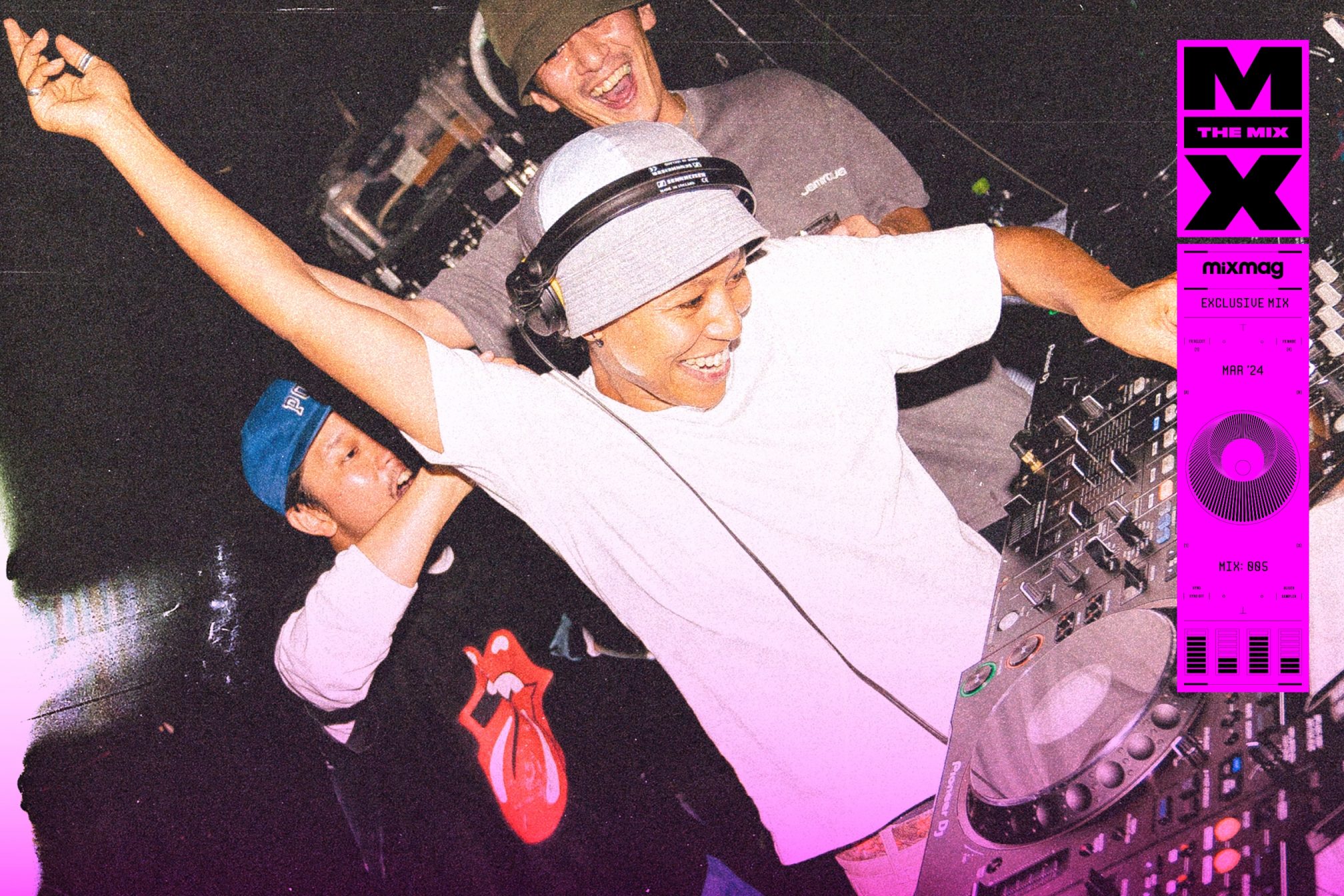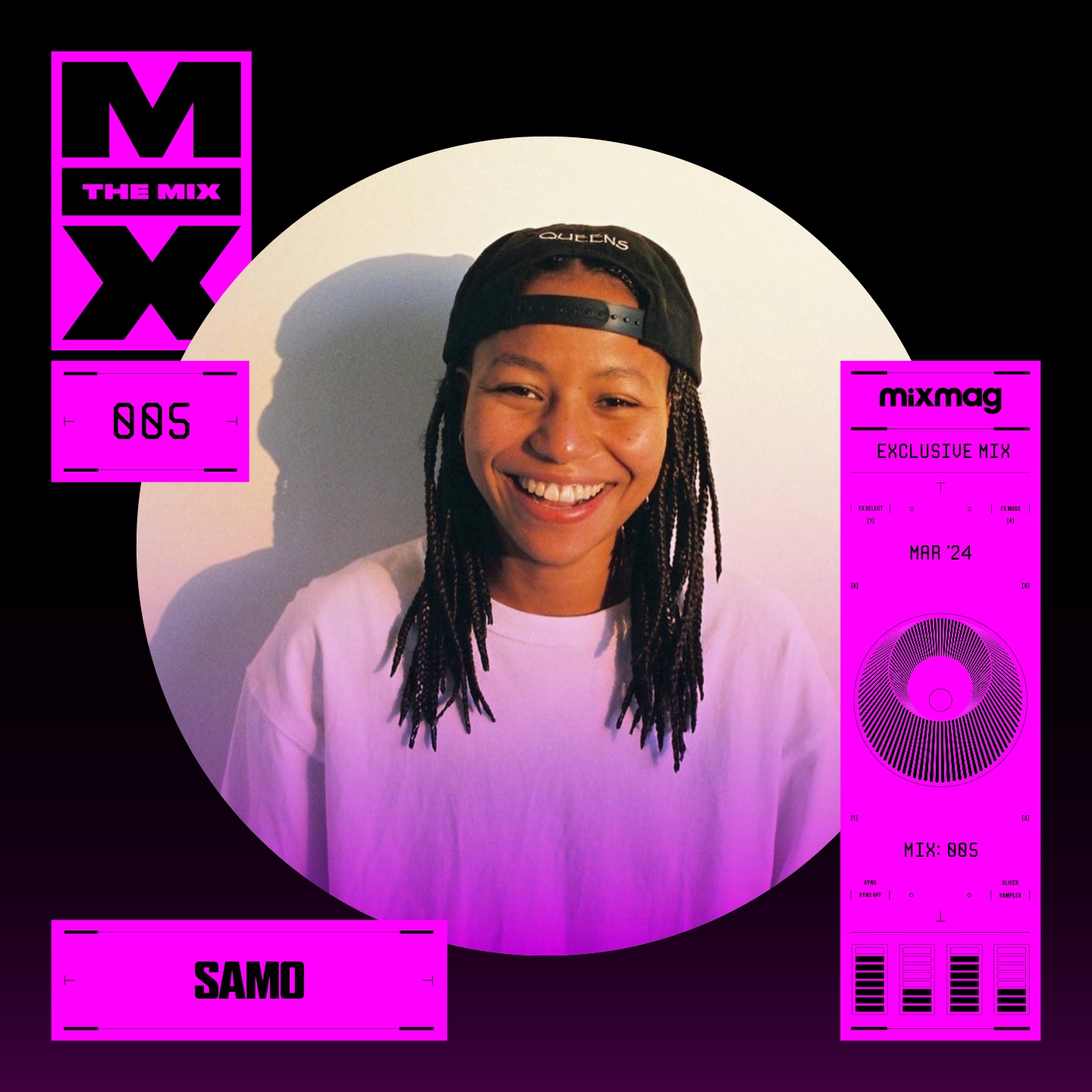 Music
Music
The Mix 005: SAMO
Tokyo-via-Osaka SAMO is a force of nature behind the decks. She shares a new mix and speaks to Kim Kahan for her first-ever interview, covering her fast-rising career and why she isn't prejudiced about genre - as long as it's danceable
The Mix is our new weekly mix and interview series — find out more about it at the end of this feature. Next up: SAMO
Since SAMO’s name began appearing on club posters in Osaka in 2020, she’s been hard to miss, with a career that seems surprisingly short when compared to her DJing ability. Her high-energy sets are characterised by eclectic selections, bound by one core feature: danceability. A recent Boiler Room set for FULLHOUSE in Osaka is a prime example. A dynamic danceathon buoyed by the tiny DJ at the decks, it starts slow then takes off, with SAMO steering the visibly enthralled crowd through every twist and turn.
The set marks a career highlight, and even a hiccup at the midpoint was unable to stop its runaway momentum. Picture the scene: you’ve quit your job to DJ full-time, no easy thing to do, especially in Japan. You’ve worked hard to get where you are and now the world is watching. The room is popping off, its intensity palpable to the online viewers. You load the track into the third CDJ, hit play — and the music stops. “I was so shocked, my mind went blank!” exclaims SAMO. “I was using three CDJs and accidentally loaded the song that was playing already, stopping it.” It’s a testament to how well things were going that the moment only seems to fuel the crowd’s intensity. For a brief second, her face is a picture of shock, but the dancers are so worked up their energy doesn’t dip, whooping and hollering to egg her on as the music quickly restarts and they go even more wild. “I really felt so grateful that everyone was cheering me on and I could feel their support,” she adds.
That reaction reflects how popular SAMO has become among the FULLHOUSE faithful for her superlative sets. The Osaka-based dance collective, where she cut her teeth, is known for its rabble-rising parties that run across all realms of dance music. The collective began in 2019 as a club night, originally with six members who played on rotation every Saturday night at Circus Osaka. Currently it’s held monthly, but its members are still tight, with SAMO recently playing in Okinawa with fellow member Ryota. SAMO is also a DJ at AMAPINIGHT, a semi-regular event started by a Tokyo-based model/dance group, which sees each party “hosted” by its members. The dancers twerk onstage and around the DJ while they play music ranging from amapiano (of course) to garage and gqom.
SAMO takes her DJ name from her own abbreviation of the phrase “Same Old Shit,’ bursting into giggles as she watches me realise that it’s a very individual way of transcription. She reveals that this is her first interview, ever, but she isn’t nervous and is relaxed as she tucks into chiffon cake piled with whipped cream.

It’s written that your mum used to go to Paradise Garage, but what did you grow up listening to? Please share your first dance music memory.
She went when she lived in New York training to be a hairdresser. She also saw Gwen Guthrie and people like that at Blue Note, which was technically a completely different vibe to Paradise Garage, but they’re both purveyors of Black music, so they’re similar in that way. When her and my dad divorced, she came back to Japan. Our family home is a hairdressers, so I grew up listening to whatever she put on in the shop, which was usually jazz. We still go to Blue Note in Osaka together.
My first dance music or club memory would’ve been going out with friends to a place in Kobe, but I’m not sure that counts. The next time would be when I was studying in New York. You couldn’t even compare clubs in New York to those in Kobe, they’re huge. But going to music festivals like Summer Sonic in Osaka in my early twenties is something that was pretty formative. Watching Disclosure was insane - the whole performance, including the VJs, seeing two silhouettes outlined by crazy lighting, was aspirational.
When did you first start DJing?
It would’ve been around 2018 or 2019, I think. I was working as a hairdresser in Kobe when the shop decided to have a pop-up event and asked if I wanted to DJ. I hadn’t had any experience then, but one of the older guys who DJed as a hobby showed me the ropes. I packed up some future beats, practised again, and again, and then played at that event.
I picked it up quite easily, I guess because I’d learned drums at a Yamaha music school for six years throughout junior and high school. It was a sensory thing, as I already knew about phrases and loops and so on, so I could just tell where the loop started from the off. I loved it as soon as I began, and was approached by Ryota to play at FULLHOUSE not long after.
Can you tell us more about the FULLHOUSE Osaka crew? How did you get involved? What can we expect at a FULLHOUSE Party?
Back then it was a weekly event, organised by Ryota, who worked at Circus Osaka at the time. It’s an underground music venue, dirty, with graffiti all over it and stickers everywhere! Just looking at the building, you’d wonder who on earth would go inside. The club is on the second floor. It’s dark, with a pretty low ceiling, and fits around 2-300 people.
The other clubs in the area were kinda trashy, and he wanted to get more young people in the underground scene. That’s when he decided to start FULLHOUSE. I think it was through Takenoko, a mutual friend who I’d played at a pop-up event with, who suggested that I play. Ryota then reached out to see if I’d be up for it. FULLHOUSE started in 2019, but the original plan wasn’t actually for it to continue for this long. Our first guest was Conducta and so many people came that we started to hold it every week.
Read this next: 8 up-and-coming Japanese DJs that you need to know
How did you start DJing full-time?
During COVID, I was off work for about two months and I’d often go into the mountains, heading up to the waterfalls by myself or with friends. I’d go there to think, and came to the decision that I’d only do things I wanted from then on. I quit the hairdressers (I’d been working there for five years) and moved to Osaka to focus on DJing. It didn’t quite work out the way I thought it would at first, I hardly got any bookings. But every Saturday FULLHOUSE was on in Circus Osaka, and I was determined just to keep going.
Who and what has been a big influence on your DJ career?
Toyo-san [the booker] from Circus Osaka. It was the first club I ever played in and where FULLHOUSE started. He’s someone who’s seen a lot of different music and when he complimented my DJing, it was a big boost to my confidence.
And of course it has to be Ryota, who originally invited me to join FULLHOUSE. Having it happen at the same time, in the same place, every week had a big impact on my playing style. During COVID there were no tourists, so it was a case of playing to the same people more or less every Saturday. So every week we had to change up our sets. I’d get new songs each time. We DJed every single Saturday for around a year-and-a-half, which was intense but so fun - it made my DJing improve a lot.
In terms of what, Honey Dijon’s 2018 Boiler Room at Sugar Mountain was a massive influence. When I first saw it, it made me so motivated. I’ve seen it tens of times. Mid-mix she drops a sample from Martin Luther King’s speech, and I felt that she was so in tune with the crowd. They’re excited, everyone’s hyped and riding on the buildups, an incredible crowd. It’s probably my favourite Boiler Room.
Japanese parents can be pretty against DJing and clubs but what do your parents think?
My mum is fine with it, even though her clubbing experience is really confined to New York, I think that she’s more American than Japanese! She was there throughout her early twenties, and hasn’t been to a club in Japan. Nowadays, she’s totally focussed on her cats - she’s got seven, all rescues.
All she really says is “don’t do drugs” [laughs]. She’s not been to a set but she checks my Instagram and watches the videos. She’s even critiqued my style before, commenting on my Boiler Room post saying that “back in the day, Larry Levan didn’t move as crazily as you do.” I think I ignored her! She’s a great mum though, we’re really close.
Please describe your playing style in three words. How has it changed since you first started?
I think “energy”, “vibes” and “sympathy.” I make people serious [about dancing]. And I want everyone to feel like they are one on the dancefloor.
I feel that when I first started, my BPM was a lot slower. I played R&B, future beats and stuff like that. Then at Circus Osaka I started to play house and techno which was super fast, and now I feel like I’ve come full circle, and can play pretty much anything.
Playing at FULLHOUSE led me to think about what sort of thing I wanted to play - Ryota for example, loves d’n’b - but eventually I realised that I don’t have a particular genre or style that I focus on. I’m not particularly fussed about who’s released which EP, the labels and so forth. Of course, there are artists that I like and if you wanted to, I’m sure that you could pinpoint a type of music that I’m into, but for me it’s not really about that. I think this has actually become my specialty, as I’m the sort of DJ who just plays the songs they like. I feel that my own innate taste is what makes my style original, rather than particular artists or genres. It’s plain dance music - not too light, not heavy!
You recently moved to Tokyo from Osaka. How has this changed your DJing approach? What are the similarities and differences between the two cities?
There are loads of different venues, and different parties every day. This doesn't happen in Osaka, where there are not that many scenes and places. Being in Tokyo, having to adapt to different styles for various parties has made my selections wider-ranging. It’s fun to try different styles. That’s the strength of a capital city!
I feel that the vibes are pretty different. Osaka is more chill and easier to play in. In all honesty, Tokyo can be quite tough at times. In Shibuya clubs like Lion, they might be packed full of people but a lot of them have just come by after work to chill, not to dance. When it gets going it’s awesome though. People who are on holiday are there to have fun so their vibes are mega, I’ve noticed this especially with Australians for some reason!
Recently, I feel that there’s become more movement between the cities, like people going from Tokyo to Osaka, even Nagoya and so on. It’s fun to be able to play with friends from each city in different places.

What's a favourite recent mix you've listened to?
I listen to Bok Bok all the time - any mix! He is so good. We played together at Enter last year, and he was insane. His song selection is on point and he has sick skills as well. His vibe fit Enter so perfectly that we had no choice but to dance - it was on a weekday, so we had space to move which was great. Sometimes that building (it has Lion on the floor above) can get so full that you can’t dance, but Bok Bok came on a Tuesday so it was just right. I danced so much!
I’ve also been listening to Scratcha DVA a lot. He came last year for amapiano night, it might’ve been the craziest one ever. All the gals just shakin’ their booties on stage non-stop, for like 3-4 hours. I couldn’t leave the dancefloor. I think Scratcha DVA and Bok Bok are kinda similar in that their energy just spills out.
Please share three top tracks you’ve been playing out a lot.
‘Baiana’, in any variation! I play it all the time. Originally it’s a Brazilian song, but there are loads of songs that sample it. So I always play ‘Baiana’, but probably not the same style that you’ve heard. Actually, ‘Baiana’ is the one that I accidentally stopped in that Boiler Room clip. Recently I’ve been listening to MFS ‘Combo’, produced by Stones Taro. She’s an Osaka rapper and coincidentally a good mate. I play it a lot. And Deltaic Regions ‘Circuit 900’.
Your music is a big upper in the clubs, but what do you listen to to relax?
I put on a lot of minimal techno. In the mornings I’ll listen to ambient style house, stuff without the bass. I also put on a lot of SoundCloud mixes.
Name a recent event you really enjoyed.
I liked playing in Gunma and Okinawa - it’s always fun to head out [of the city]. I also have to shout out FULLHOUSE and AMAPINIGHT, which are always super fun, every time. I got involved with AMAPINIGHT when Sakura [Slammin’ Sakura, host and organiser] asked me to play at their event in Osaka and it was so much fun I ended up being involved ever since. They booked me and Takenoko, another FULLHOUSE member, to play, alongside Mitokon who’s a member of TYO GQOM. The event was held at a showroom that Takenoko had at the time. Literally just like a little gallery, that happened to have a soundsystem. Over 100 people came and it absolutely went off.
You are often booked to support foreign artists for clubs like Circus. Do you think there’s a difference between domestic and home styles? How do you approach a set when you’re on the bill with big names?
I learn a lot from the sounds and energies of overseas artists. When I’m supporting, I tend to think of it as a one-person show. We’re all there to add to the overall night, so I consider who else is on the bill too, adding to the whole event. I’m often asked to play before or after them, so I select songs while thinking about what kind of flow would be best. It’s quite exciting because I can’t really imagine how or what they’re going to play until they do it, so it's a case of being in the moment.
Future plans?
This year is my year to play all over Japan. I’ve already got quite a few bookings lined up which I’m looking forward to, and I want to play more outside, at festivals. I’m excited for Rainbow Disco Club [next month]. I haven’t been yet and I was really happy when I got the offer.
Next year I want to start playing abroad. I think it’ll be really fun to be able to go abroad with the rest of the FULLHOUSE crew, so we can bring the party to wherever we are.
Read this next: "Genuinely needed": How WAIFU is revolutionising Tokyo's queer nightlife
What do you think about the Japanese scene in terms of gender equality?
This is actually something I was speaking about with Nasthug the other day. It’s an issue here, especially within the hip hop scene, women rarely get a chance to play. It’s not that they're not there — to be honest I think that female DJs might even be better! — but they're never picked to play. It always seems to be promoters putting on the people that they already know. If it was in terms of skill, I reckon it’d be different, but that’s not really how it works.
We’ve got to keep going! And hope that promoters start doing more. There are great DJs in the scene, like Pixie, Akie and so on. We need to big ourselves up.
Across the global DJ scene, a lot of DJs are drawing attention to social events and doing social activism, but this doesn’t seem to be as prominent in Japan. Why do you think this is?
For starters, I guess people just aren’t aware of it, they aren’t checking what’s going on, and people are happy just not knowing. Since the war in Ukraine started, everyday something else happens, so people have gradually become desensitised to what’s happening.
Tell us about the mix you’ve provided for Mixmag.
I’ve done it as a mix that you can listen to in your house or wherever you are. I figured that a mix which conveys “peace” is best, something which is warm and a bit lighter than my normal club mixes. The bass is more on the subtle side, and I put a lot of UK artists in there.
Anything to add?
I hope for a world full of love, in which everyone (including animals) can dance together in peace. Free Palestine!
Kim Kahan is a freelance writer, check out their website

Tracklist:
Joy Orbison - Burn (Ft Infinite & Mansur Brown)
DJ DISK & SAMO - ID
French Fries, Coni - Liquids
Lurka - Powers
Guti - You Only Live Once
YAK - Don Greno
Jay Carder - Eva’s Stoned
Kin Teal - In Hindsight
Danvers - 11th Step
Breaka - Lime Bike Elf Bar
Bluetoof - Kaput
Sleep D - Special Sector
D. Tiffany, Roza Terenzi - Gravity Bongo
James Bangura - Synthetic Sustenance
Skee Mask, MJK, Riko Dan - One By One
L-Vis 1990 - Flexin ft Taliwhoah (Garage Mix)
About The Mix:
The Mix is our new online mix and interview series, dedicated to the spectrum of electronic music from around the globe, exploring sounds and stories from the early days of rave to the future.
Mixmag has a long history of publishing mixes, from our legendary cover CDs accompanying the print magazine to our worldwide video streams in The Lab. Last year we celebrated 40 years in the game and The Mix now arrives as a fresh outlet to document DJs and the musical movements they represent, showcasing their sound alongside an in-depth interview. The design pays homage to a previous Mixmag logo from the early ’90s nodding to our heritage while using the square and rectangular building blocks to construct an aesthetic that works cohesively with contemporary design elements and digital motion systems.
We’ll still be bringing you the Cover Mix, The Lab and occasional sets in other formats, with The Mix is taking the place of our In Session and Impact features, intending to bring an updated look and vision to our flagship weekly DJ profile and sequencing them into one place, without separation. We hope you enjoy.
Patrick Hinton (Editor & Digital Director) & Keenen Sutherland (Senior Designer)


